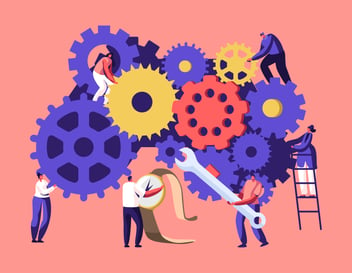What kind of leadership can get us to the most effective and desired results in business? Most organizations think about development from a skill perspective, focusing on competencies and tools. However, the landscape of effective leadership in today’s world is evolving and requires a fresh perspective and effective problem-solving. In this episode of Qonversations, Jessica Bronzert, founder, and CEO of Sparks Group, guides us through a unique, relatively new approach called vertical development, which challenges the conventional view of leadership growth and offers new insights for achieving transformative outcomes.
Horizontal vs Vertical Development
The traditional (horizontal) view on leadership development has centered primarily on increasing more skills and building technical competencies. In contrast, vertical development suggests that our journey toward successful leadership starts from how we think, from the ability to widen our perspective and expand our worldview, to increasing our ability to navigate complexity. So vertical growth is all about self-development and becoming more mature. Horizontal development builds skillsets, while maturing vertically helps build an interconnected leadership culture in one’s organization.
Vertical development in business emerged from a psychological framework that explores how adults mature throughout their lives. Traditionally, psychologists used to believe that our psychological development stopped with our physical development in early adulthood, essentially by the time we were 18 or 21. The new vertical approach questioned this traditional idea of growth and focused on self-development, introducing the stages of adult intellectual development. These stages are quite applicable to leadership skills and go beyond technical competencies; they focus on a person's worldview, beliefs, and meaning-making system.
“A person's stage or stages of vertical development are highly correlated with one's leadership effectiveness and ability to get organizational outcomes.”
Vertical Development Stages
There are several stages of vertical development, and they each offer unique insights into the leader's mindset and behavior:
- Self-Oriented (Opportunist): This stage is characterized by a perspective where one is primarily focused on personal desires and needs.
- Group-Centric (Diplomat): At this stage, individuals become highly influenced by group identity and absorb the beliefs of larger social groups.
- Expert (Skill-Centric): The majority of adults operate from this stage. They see themselves as their expertise and believe they know best.
- Achiever (Self-Driven): This stage involves a shift toward teamwork and goal-driven behavior.
- Self-Questioning (Individualist): This stage is marked by increased self-awareness, the ability to balance being and doing, and openness to outside perspectives.
- Transformational (Self-Transforming): This stage is correlated with the ability to achieve and sustain change. Transformational leadership is characterized by taking multiple perspectives, holding opposing ideas, and architecting bigger outcomes.
- Late Stages: Few individuals reach these late stages, where thinking becomes more spiritual, and the ability to work for generational change and global transformation emerges. This is where we see people potentially like Martin Luther King, Mother Teresa, Nelson Mandela, people who had a vision for generational change, or change that extends past their own lifetimes.
“Vertical development is all about your ability to see and navigate complexity, hold multiple perspectives, self-reflect on your own thinking, and hold competing or opposing ideas simultaneously.”
Why Vertical Development Matters
The business environment requires adaptable leaders and a proper business strategy. Making it even more essential than before, disruptors such as artificial intelligence or pandemics underline the importance of vertical growth. Expanding your mindset — adapting and changing the way you think and behave — is essential to adapt to this challenging modern business environment. Leaders must expand their capacities to navigate complexity, embrace diverse viewpoints, and integrate opposing ideas effectively.
No Cure for Being Human
Understanding your stage of vertical development, as Jessica emphasizes, is the initial step toward growth. This awareness offers guidance for both personal and leadership development. Leaders can encourage their teams to embark on their own upward growth journeys.
There is real value every time we self-reflect, but there can be a real danger because we can tend to see ourselves as different rather than recognizing that all these things we're experiencing are part of the human condition, part of the journey of growth and development and maturity. And we can choose to stay there, or we can choose to continue to move forward.
When we are learning skills or knowledge, we are developing horizontally, while vertical approach develops mindsets, habits, and emotions. Horizontal development focuses on expertise and technical competencies, while vertical growth empowers you to put that knowledge into practice. Both are needed to get the desired results. Both are interconnected, and the vertical progress is a good outcome of proper horizontal development.
We can observe vertical development as a real and impactful approach, a lens that challenges traditional views of leadership growth. This approach may be essential to help us form the right business strategy and provide us with insights on how leaders can transform and tackle modern complexities, create new opportunities to maximize their impact and drive transformative change in their organizations.
Listen to the full conversation.
Have you explored other insightful episodes of Qonversations? Here are some of our recommendations:
- Episode 051: "Fixing Work"
- Episode 046: "Unlocking Potential and Inspiring Greatness"
- Episode 045: "Controlling Your Success at Work"




